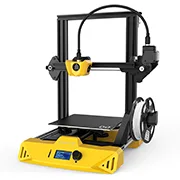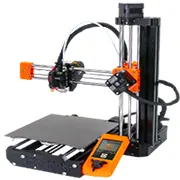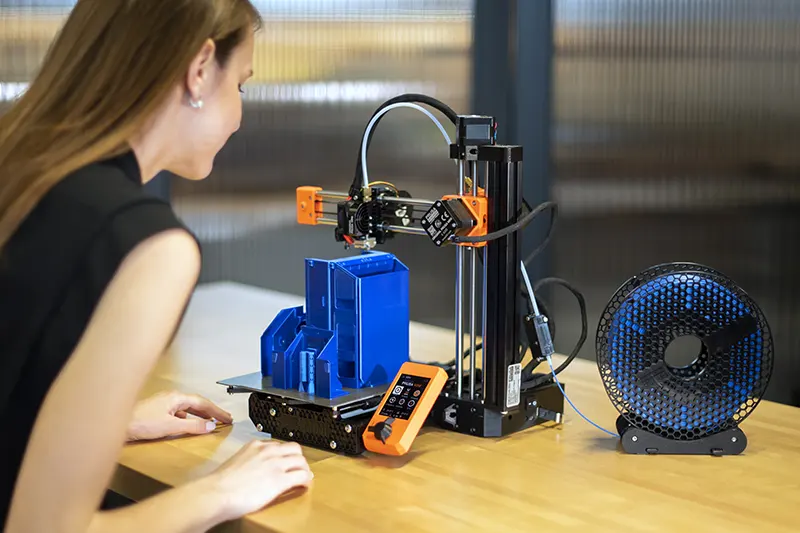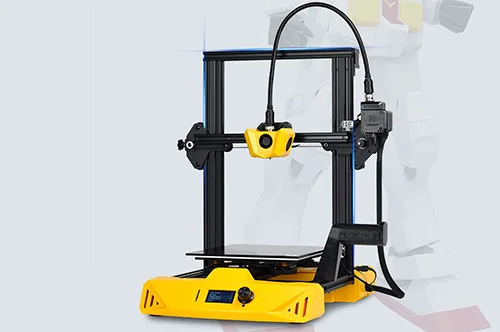The Prusa Mini provides a hassle-free experience for beginners but this comes with an increased price tag and slightly smaller build volume.
One cheaper alternative is the Artillery Hornet, which is the smallest of Artillery's FDM printers. The Kingroon KP3S is also a quality pick for under $200.
The Artillery Hornet is cheaper than the Prusa Mini and sports a larger build volume but at the sacrifice of higher-temperature printing and auto-bed leveling.
Artillery Hornet
$200
Assembly: Partial
Extruder: Bowden
Auto-Leveling: No
Max Nozzle Temp: 230°C (260°C)
Max Bed Temp: ≈110°C
Print Volume: 220mm (L) 220mm (W) 250mm (H)

Prusa Mini
$429/459
Assembly: Kit or Fully
Extruder: Bowden
Auto-Leveling: Yes
Max Nozzle Temp: 280°C
Max Bed Temp: 100°C
Print Volume: 180mm (L) 180mm (W) 180mm (H)

Photo credits: (c) Prusa Research - prusa3d.com
Artillery Hornet and Prusa Mini
- Both printers have a bowden extruder.
- Both printers can be connected locally and networked. The Artillery Hornet has a SD and USB B - the Prusa Mini has a USB A, micro USB, and Ethernet port.
Prusa Mini
- The Prusa Mini comes with a build volume cube of 180x180x180 mm.
- What filaments can it print at 280°C? PLA, PETG, ABS, ASA, PC (low temps), and even flexibles like TPU.
- The printer comes with automatic mesh bed leveling.
- The Mini has a magnetic PEI steel sheet for the print surface.
- Prusa has a fantastic track record for customer service and quality - any issues you have should be solved by their 24/7 support + their warranty + the community.
- The Prusa Mini is the printer for you if: you are new to 3D printing and want to avoid tinkering, are wanting to start a print farm, or are an institution that wishes to implement FDM printers in the classroom or lab.

Prusa Mini Specifications
- Release Year: 2019
- Assembly: Kit or Assembled
- Build Volume: 180 x 180 x 180 mm
- Extruder: Bowden
- PTFE-Lined: No
- Max Nozzle Temp: 280°C
- Max Bed Temp: 100°C
- Bed Material: PEI Spring Steel Sheet
- Auto-Leveling: Yes - Induction
- Z-Axis: Single
- Connections: SD, USB, and Ethernet
Artillery Hornet
- The Artillery Hornet comes with a build volume of 220x220x250 mm.
- There is not an all-metal hotend, which means that the PTFE tube will begin to off-gas above 230°C. It is recommended to replace the heatbreak or hotend if you want to print at higher temperatures.
- What filaments can it print at 260°C? PLA, PETG, ABS/ASA, and flexibles with some tweaking.
- The printer comes with a non-removeable, tempered glass bed attached to an aluminum plate.
- The bed's cables have a tendency to snap, so it is recommended to print or purchase a strain relief.
- Avoid buying this printer on Amazon as the majority of the listings are resellers not Artillery. One of the official channels for purchasing is AliExpress.

Hornet Specifications
- Release Year: 2020
- Assembly: Partial
- Build Volume: 220 x 220 x 250 mm
- Extruder: Bowden
- PTFE-Lined: Yes
- Max Nozzle Temp: 230°C (260°C)
- Max Bed Temp: 140°C
- Bed Material: Glass
- Auto-Leveling: No
- Z-Axis: Single
- Connections: SD & USB Type B
Disclaimer: You assume all responsibility and risk for the use of, but not limited to, the resources, advice, and opinions of 4D Filtration or its employees. 4D Filtration or its employees do not assume any liability or create any warranty for the use of any information. 4D Filtration may receive commissions for referral links. Prices are approximated for simplicity and they may fluctuate due to sales or markdowns. Amazon .com should refer you to your local amazon site if you are not in the United States; there is a chance Amazon's link redirect system will take you to a different product.